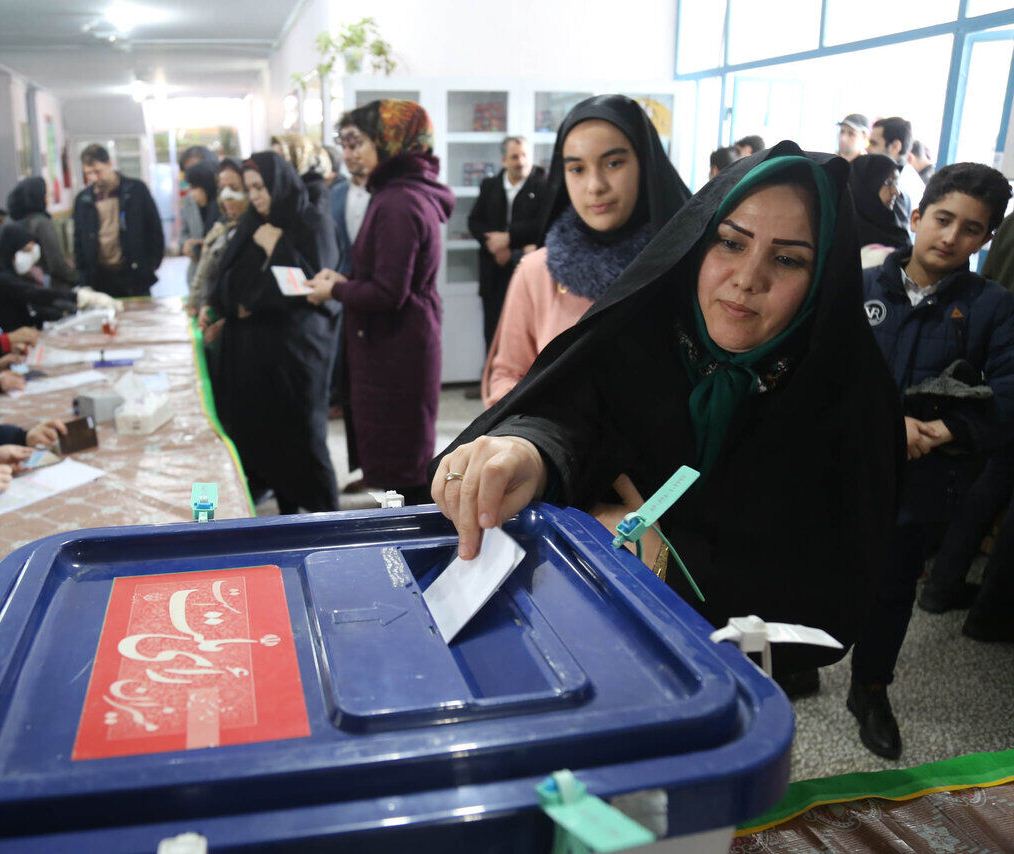Supreme Leader of Islamic Republic Ayatollah Ali Khamenei called for high turnout in the upcoming Iranian election, saying that a low turnout would help "the enemy" put pressure on Tehran.
“It is a few months now that the American and British media are trying very hard to decrease the people’s presence at the ballot boxes. Of course, experience has shown that the people have done the opposite of what the enemy wanted. This will be the case this time too, God willing,” Khamenei said in a televised speech on June 16, two days before the presidential and local councils’ elections.
“Those who are discouraging the people from participating in the elections are working to weaken the Islamic government in order to turn the country into a parade ground for terrorists,” he said, adding that “the people’s support of the system must be shown to the enemy.”
On June 18, Iranians will elect the 13th president of the Islamic Republic, as well as officials of city and village councils. Voters will also participate in a special election to choose members of the parliament and the Assembly of Experts, the leadership watchdog.
Following the withdrawals of some of the candidates, the remaining candidates are Judiciary Chief Ebrahim Raisi, conservative Expediency Council Secretary Mohsen Rezai, Amir Hossein Qazizadeh-Hashemi and moderate technocrat Abdolnasser Hemmati.
The hardline candidate Ebrahim Raisi has 63.7% support among (6,582) respondents after three candidates dropped out on June 16, according to a recent survey conducted by the state-backed Iranian Students Polling Agency (ISPA).
Abdolnasser Hemmati - the only reformist and non-conservative in the race - has 4.2% support. Conservative MP Alireza Zakani and Former Chief Nuclear Negotiator Saeed Jalili withdrew from the race and endorsed Raisi on the final day of campaigning. A reformist candidate, Former Vice president Mohsen Mehralizadeh dropped out of the race in a move to unify the reformist vote.
Based on surveys, ISPA predicts a 42% turnout in the June 18 election, which is a record low turnout. High turnout in elections has always been a vital aspect of Iran's official narrative that the Islamic system is based on popular legitimacy.
Despite the fact that Supreme Leader Ayatollah Ali Khamenei and other senior religious and political figures have urged the public to vote, many conservatives have not echoed such calls. Guardian Council Spokesperson Abbasali Kadkhodai told the Associated Press that "low turnout does not bring about any legal problems" with the legitimacy of the election.
Meanwhile, reformists warn that a low turnout will benefit conservatives. In May, Rouhani urged the Guardian Council to approve a variety of candidates to "encourage" voters to head to the polls or risk a low turnout.
During a weekly cabinet meeting on June 16, Iranian President Hassan Rouhani urged voters to actively participate in the election amid concerns about a record low turnout.
Rouhani also criticized the presidential candidates for blaming his government without talking about the impact that the US sanctions imposed by former President Donald Trump have had on Iran's economy.
"During the campaigning, nobody's talked about America's crimes. Not one person mentioned Trump," the Iranian president said.
In May 2018, Trump’s administration pulled out of the Joint Comprehensive Plan of Action (JCPOA), widely known as the 2015 nuclear deal, and re-imposed sanctions on Tehran. Iran retaliated by abandoning most of its obligations and accelerating its nuclear program. Iran has recently produced 62.8 kilograms of uranium enriched up to 20 percent purity and 2.4 kilograms enriched up to 60 percent purity — well above the 3.67 percent purity allowed under the nuclear deal.
Several rounds of talks on reviving the nuclear deal (JCPOA) between the deal’s remaining signatories (France, Germany, the UK, Russia, China, the EU and Iran) and a US delegation were held in Vienna since April 2021.







 Russian peacekeeping forces, deployed in the Karabakh (Garabagh) region of Azerbaijan since 2020, have commenced their withdrawal from the area.
Russian peacekeeping forces, deployed in the Karabakh (Garabagh) region of Azerbaijan since 2020, have commenced their withdrawal from the area.
 The number of evacuees from flooded areas in Kazakhstan has reached 97,852 people, including about 32,856 children since March 27.
The number of evacuees from flooded areas in Kazakhstan has reached 97,852 people, including about 32,856 children since March 27.
 The Islamic holy month of fasting, Ramadan comes to an end this week with the celebration of a joyous festival called Eid (meaning “festival” in Ar...
The Islamic holy month of fasting, Ramadan comes to an end this week with the celebration of a joyous festival called Eid (meaning “festival” in Ar...
 Iran's senior military leaders described the drone and missile attack on Israel on April 14 night as “successful".
Iran's senior military leaders described the drone and missile attack on Israel on April 14 night as “successful".
 Azerbaijan officially unveiled the logo for the upcoming 29th session of the Conference of the Parties to the United Nations Framework Convention o...
Azerbaijan officially unveiled the logo for the upcoming 29th session of the Conference of the Parties to the United Nations Framework Convention o...
 Iranian President Ebrahim Raisi warned Israel that it would face a "real and extensive" response if it makes any "mistake" following Tehran’s missi...
Iranian President Ebrahim Raisi warned Israel that it would face a "real and extensive" response if it makes any "mistake" following Tehran’s missi...



